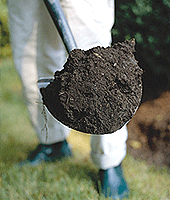Advertisement
The Compost Recipe or Gardener’s Gold Rush
Many Canadian municipalities are expanding their organic waste diversion programs. Compost-savvy plant lovers are choosing instead to hang on to their humus, treasuring the properties of this rich, black soil. An Organic Gold Mine Compost, often called “black gold” by gardeners, is simply decomposed organic matter. Organisms in a composting system break down vegetable scraps, … Continued

Many Canadian municipalities are expanding their organic waste diversion programs. Compost-savvy plant lovers are choosing instead to hang on to their humus, treasuring the properties of this rich, black soil.
An Organic Gold Mine
Compost, often called “black gold” by gardeners, is simply decomposed organic matter. Organisms in a composting system break down vegetable scraps, leaves, and yard waste, creating humus, a dark, nutrient-packed material. Rather than being reminiscent of the local dump, finished compost smells earthy and sweet.
The foundation of a fruitful garden is lush, hearty soil. Poor soil can yield weak plants that are vulnerable to disease and harsh weather conditions. Strengthen your plants by building your soil with compost.
Spreading the Wealth
Healthy soil starts with two basic elements: air and water. Mixing compost into your garden ensures proper soil aeration, which supports beneficial micro-organisms and solid root growth. Compost also increases water retention in the soil, providing your plants with an oasis during dry spells. Using compost in your garden creates an ideal growing environment.
The magic of compost doesn’t end there! While chemical fertilizers may claim to provide ideal NPK (nitrogen, phosphorus, potassium) ratios, essential micronutrients may be missing. Compost is nature’s perfect fertilizer. Its diverse spectrum of nutrients and micronutrients are slowly released over the growing season. Synthetic fertilizers simply can’t replicate this. In fact, compost improves your soil’s ability to retain nutrients, making it healthier and more sustainable over the long-term.
Starting Your Own Gold Mine
Once you are ready to begin composting, choose the system that fits your lifestyle. Outdoor compost units are common in urban settings. Keeping your compost in a bin rather than
leaving it in an open pile will keep you popular with the neighbours and discourage scavenging wildlife.
You can easily build your own single- or multi-bin system, or purchase one through your municipality. It will likely take two to three months for the raw compost to morph into rich, dark organic matter using a fixed bin. If you can’t wait that long, consider a tumbler-style composter, such as the Envirocycle (envirocyclesystems.com), which increases aeration and speeds composting to just four to six weeks.
If outdoor space is limited, try vermicomposting. Tiny red wiggler worms in these indoor systems devour their own weight in food every two days. And don’t fear a great worm escape: these voracious homebodies won’t stray from a good food supply. Their waste product, called castings, can be sterilized for use indoors or steeped in hot water to make a potent “compost tea” for your plants. Ideal for apartment dwellers, a properly maintained bin will not smell or attract insects.
Municipalities are taking impressive steps to reduce organics in the waste stream, but keeping compostables closer to home reduces the impact of transporting and processing them. Home composting creates nature’s perfect soil amendment, pleasing your plants, boosting your soil, and saving landfill space at the same time.





